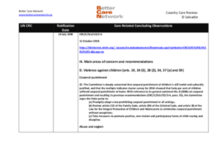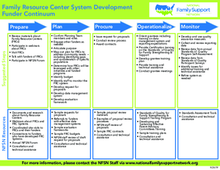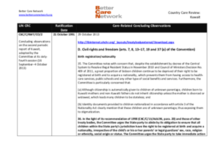Displaying 221 - 230 of 947
Based on semi-structured interviews with parents involved with child protective services (CPS), this study explored these parents’ self-identified parenting strengths in light of their family-of-origin experiences.
This country care review includes the care related Concluding Observations adopted by the Committee on the Rights of the Child and the Committee on the Rights of Persons with Disabilities as part of its examination of El Salvador's initial reports, as well as other care-related concluding observations, ratification dates, and links to the Universal Periodic Review and Hague Intercountry Adoption Country Profile.
This country care review includes the Concluding Observations of the Committee on the Rights of the Child and the Committee on the Rights of Persons with Disabilities. The Committees' recommendations on the issue of Family Environment and Alternative Care, and other care relevant issues, are highlighted.
This guide from the National Family Support Network provides a brief outline of suggested steps for funders to invest in Family Resource Centers, including resources from the National Family Support Network for each step.
This country care review includes the Concluding Observations for the Committee on the Rights of the Child and the Committee on the Rights of Persons with Disabilities adopted as part of their examinations of Kuwait’s periodic reports.
This country care review includes the Concluding Observations for the Committee on the Rights of the Child and the Committee on the Rights of Persons with Disabilities adopted as part of the Committees' examinations of Greece’s reports, as well as other care-related concluding observations, ratification dates, and links to the Universal Periodic Review and Hague Intercountry Adoption Country Profile.
The aim of this module from the book Rights-based Integrated Child Protection Service Delivery Systems is to learn about children and families at risk and the need for rights-based Integrated Child Care and Support Centres.
This video shares some of the key learning from the pilot phase of Cambodian Children’s Trust Holistic Family Preservation Program in rural Cambodia.
In this video Children in Families social workers share their experience of using a cluster model to enhance the social support available to foster carers in Cambodia whilst reducing the demands placed on organisational resources.
Comprised of 12 videos and accompanying discussion guides, this video series features the learning from practitioners working across a range of care-related programs and practices in Cambodia.





